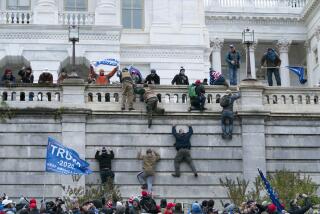When Politics Is Seen as a Moral Force : Czechoslovakia: Behind the Velvet Revolution stands a nation’s history, its culture and a commitment to nonviolence.
- Share via
PRAGUE, Czechoslovakia — The Peaceful Revolution. The Tender Revolution. The Velvet Revolution .
This is how Czechoslovakian citizens describe the swift events that have broken the Communist Party’s monopoly of power and catapulted Vaclav Havel--playwright, dissident, political prisoner just seven months ago--into the presidency. What has enabled this nation of 15 million to pull off a revolution without the bloodshed seen in Romania or the acts of vengeance witnessed in East Germany?
An incomplete answer lies in the timing of the Bush-Gorbachev Malta summit in early December, two weeks after the Civic Forum was formed here. Even if Czechoslovakian Communist hard-liners were bent on a “Beijing solution,” it is widely believed here that Mikhail S. Gorbachev would have ruled it out.
More compellingly, explanations for the country’s peaceful revolution can be found in the new leadership’s commitment to nonviolence, in the intellectual ideas that have been recently fermenting here and in the history and culture of Czechoslovakia.
Nonviolence is a principle of the Civic Forum and is embodied in the name of its Slovak counterpart, the Public Against Violence. “We don’t want violence!” is the refrain of posters and student chants. Civic Forum activists also spread this word in their travels into the countryside.
I joined one such trip to Zvikovske Podhradi, a town of 300 in southern Bohemia. Three days before Christmas, residents gathered in the local pub to air in public their long-suppressed thoughts. A 44-year-old man recalled the repression that had followed the crushing of the 1968 Prague Spring. An elderly man recited the names of four people who had been found hanged in their homes during the forced agricultural collectivization in the late ‘40s. Residents complained about Communist Party privileges and questioned how any party members could be trusted or allowed to join the Civic Forum.
A gray-haired representative of the Civic Forum, however, urged his audience to forget these and other past evils and to judge people as individuals, regardless of party membership. A university student from Prague noted pointedly that Thomas Masaryk, Czechoslovakia’s founder and first president, sought to foster democracy and social cohesion by admonishing his countrymen to seek out the good in each other.
The idea of politics as a moral force has deep roots in Czechoslovakia. Martin Palous, 39, a Civic Forum leader and former spokesman for the Charter 77 human-rights movement, said that Jan Patocka, the Czech philosopher and guiding spirit of the movement, stressed “the intrinsic and profound relation between the moral pre-political attitude and the possibility to be engaged in real politics.”
Another Czech philosopher, Vaclav Benda, advanced the concept of a “parallel polis. “ This, he recently explained to me, “would form the basis of a civic society excluding the existing power structure.” Individuals and associations would create their own space for independent activities in the fields of culture, economic analysis, foreign policy and information. Benda said that when he first proposed this idea in 1978, there was but one samizdat publication. By last year, the number of manuscripts had grown to more than 120.
The parallel polis, continued Benda, would “prepare for a future transition from totalitarianism to democracy.” Indeed, the polis has proved to be a repository of the nation’s values; now its participants are plunging directly into the rebuilding of official society. Benda, a 43-year-old with a patriarchal beard, is now a member of Parliament and founder of the Czech Christian Democratic Party.
Twice before, the Czech people have experienced national reawakenings led by actors, writers or philosophers. Masaryk, who secured independence for Czechoslovakia in 1918, was a professor of philosophy and sociology. Under his leadership, the country became the crown jewel of democracy in Central and Eastern Europe, with an advanced industry and a flourishing culture.
In 1621 and during the Thirty Years War, most of the Czech population and all of its nobility perished or were forced abroad. The Protestant religion was suppressed; the Czech language was relegated to the peasantry. Then, in the late 18th century, the Czech people emerged from these disasters with a National Renaissance that awakened a sense of nationalism. Playwrights and poets played a central role in it by reviving and modernizing the Czech language, which traveling actors spread to a then-illiterate populace. Today, Czechoslovakia is carrying on this tradition: It has a playwright president and its stage actors--who are also popular TV stars--were among the first to strike and speak out for a democratic revolution.
The 15th-Century religious reformer Jan Hus preached: “Seek the Truth, learn the Truth, love the Truth, speak the Truth, hold to the Truth, defend the Truth to the death!” “The Truth Prevails!” was Masaryk’s phrase. In recent weeks, Prague and other cities have been plastered with posters bearing Havel’s picture and the words, “Truth and love must prevail over lies and hatred.”
In his 1978 essay “The Power of the Powerless” (dedicated to the philosopher Patocka), Havel examined the post-Stalinist social edifice of lies and explored how individuals could free themselves, regain their identity and “live in the truth.”
Today, as Czechoslovakia enters a new decade and a new era, as it navigates the transition to democracy, a market economy and an unstifled culture, it is once again regaining its identity.
More to Read
Sign up for Essential California
The most important California stories and recommendations in your inbox every morning.
You may occasionally receive promotional content from the Los Angeles Times.













